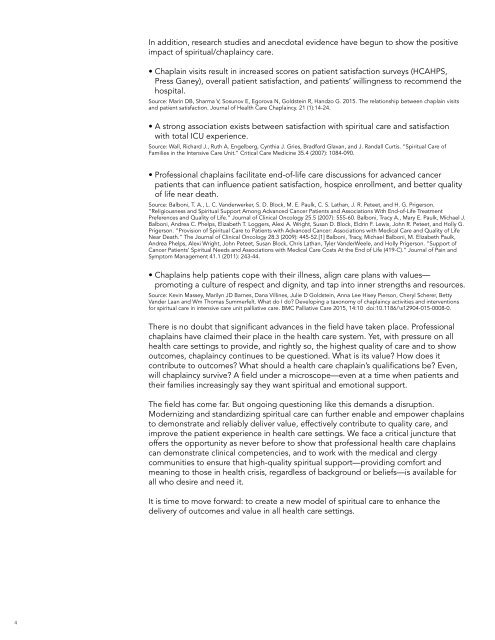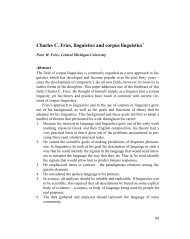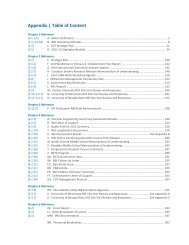TIME TO MOVE FORWARD
time_to_move_forward_report_2016-06-07
time_to_move_forward_report_2016-06-07
You also want an ePaper? Increase the reach of your titles
YUMPU automatically turns print PDFs into web optimized ePapers that Google loves.
In addition, research studies and anecdotal evidence have begun to show the positive<br />
impact of spiritual/chaplaincy care.<br />
• Chaplain visits result in increased scores on patient satisfaction surveys (HCAHPS,<br />
Press Ganey), overall patient satisfaction, and patients’ willingness to recommend the<br />
hospital.<br />
Source: Marin DB, Sharma V, Sosunov E, Egorova N, Goldstein R, Handzo G. 2015. The relationship between chaplain visits<br />
and patient satisfaction. Journal of Health Care Chaplaincy. 21 (1):14-24.<br />
• A strong association exists between satisfaction with spiritual care and satisfaction<br />
with total ICU experience.<br />
Source: Wall, Richard J., Ruth A. Engelberg, Cynthia J. Gries, Bradford Glavan, and J. Randall Curtis. “Spiritual Care of<br />
Families in the Intensive Care Unit.” Critical Care Medicine 35.4 (2007): 1084-090.<br />
• Professional chaplains facilitate end-of-life care discussions for advanced cancer<br />
patients that can influence patient satisfaction, hospice enrollment, and better quality<br />
of life near death.<br />
Source: Balboni, T. A., L. C. Vanderwerker, S. D. Block, M. E. Paulk, C. S. Lathan, J. R. Peteet, and H. G. Prigerson.<br />
“Religiousness and Spiritual Support Among Advanced Cancer Patients and Associations With End-of-Life Treatment<br />
Preferences and Quality of Life.” Journal of Clinical Oncology 25.5 (2007): 555-60. Balboni, Tracy A., Mary E. Paulk, Michael J.<br />
Balboni, Andrea C. Phelps, Elizabeth T. Loggers, Alexi A. Wright, Susan D. Block, Eldrin F. Lewis, John R. Peteet, and Holly G.<br />
Prigerson. “Provision of Spiritual Care to Patients with Advanced Cancer: Associations with Medical Care and Quality of Life<br />
Near Death.” The Journal of Clinical Oncology 28.3 (2009): 445-52.[1] Balboni, Tracy, Michael Balboni, M. Elizabeth Paulk,<br />
Andrea Phelps, Alexi Wright, John Peteet, Susan Block, Chris Lathan, Tyler VanderWeele, and Holly Prigerson. “Support of<br />
Cancer Patients’ Spiritual Needs and Associations with Medical Care Costs At the End of Life (419-C).” Journal of Pain and<br />
Symptom Management 41.1 (2011): 243-44.<br />
• Chaplains help patients cope with their illness, align care plans with values—<br />
promoting a culture of respect and dignity, and tap into inner strengths and resources.<br />
Source: Kevin Massey, Marilyn JD Barnes, Dana Villines, Julie D Goldstein, Anna Lee Hisey Pierson, Cheryl Scherer, Betty<br />
Vander Laan and Wm Thomas Summerfelt. What do I do? Developing a taxonomy of chaplaincy activities and interventions<br />
for spiritual care in intensive care unit palliative care. BMC Palliative Care 2015, 14:10 doi:10.1186/\s12904-015-0008-0.<br />
There is no doubt that significant advances in the field have taken place. Professional<br />
chaplains have claimed their place in the health care system. Yet, with pressure on all<br />
health care settings to provide, and rightly so, the highest quality of care and to show<br />
outcomes, chaplaincy continues to be questioned. What is its value? How does it<br />
contribute to outcomes? What should a health care chaplain’s qualifications be? Even,<br />
will chaplaincy survive? A field under a microscope—even at a time when patients and<br />
their families increasingly say they want spiritual and emotional support.<br />
The field has come far. But ongoing questioning like this demands a disruption.<br />
Modernizing and standardizing spiritual care can further enable and empower chaplains<br />
to demonstrate and reliably deliver value, effectively contribute to quality care, and<br />
improve the patient experience in health care settings. We face a critical juncture that<br />
offers the opportunity as never before to show that professional health care chaplains<br />
can demonstrate clinical competencies, and to work with the medical and clergy<br />
communities to ensure that high-quality spiritual support—providing comfort and<br />
meaning to those in health crisis, regardless of background or beliefs—is available for<br />
all who desire and need it.<br />
It is time to move forward: to create a new model of spiritual care to enhance the<br />
delivery of outcomes and value in all health care settings.<br />
4








